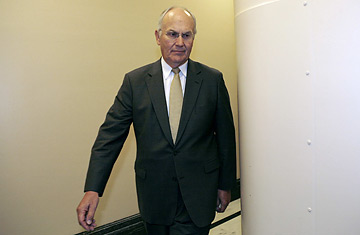
Idaho Senator Larry Craig
Senator Larry Craig's defense did not get off to a good start on Wednesday in the Hennepin County Fourth Judicial District Courthouse in Edina, in suburban Minneapolis.
With eyebrows descending and arms crossed behind his head, Hennepin County Judge Charles Porter interrupted Craig's attorney Billy Martin as he tried to make the intricate argument that intentional contact is necessary in order to charge Sen. Larry Craig with disorderly conduct charges. "Disorderly conduct is so innocuous and ambiguous, and there is no factual basis," Martin argued to Porter.
"I don't know," the judge said, contorting his face and positing that if he were to run around the bench shaking his fist at Martin but not touching him, "It might cause you to become alarmed." Crossing his arms, Porter — a former Navy Lt. Commander — said Craig didn't have to intend "to arouse alarm, anger, or resentment in others" with his actions, as Minnesota law stipulates, in order to qualify for the charge of disorderly conduct. "All he has to do is do what he did," Porter said.
In a courtroom packed with reporters, Martin and his fellow defense lawyers had an uphill battle. When Craig was arrested, he pleaded guilty to the disorderly conduct charge for allegedly soliciting what turned out to be an undercover policeman in the men's room of the Minneapolis International Airport. Now, they were trying to argue that "manifest injustice" had occurred in the months since the Senator's June 11 arrest; thus his original guilty plea should be thrown out. Judge Porter would not let them have an easy time of it, interrupting the defense several times. He interrupted the prosecution only once.
The actions the defense contested appeared simple: a few taps of the foot; three swipes of the hand, peering through a crack of a restroom stall. Defense attorney Billy Martin argued that "none of those facts in and of themselves constitute a crime." The defense also argued that the absence of a judge's signature on Craig's original plea petition should nullify it. Judge Porter did not look kindly on it. His definition of disorderly conduct is going be hard to overcome.
The prosecution, for its part, defended the disorderly conduct statute. "This statute keeps us within the bounds of a civilized society," said prosecutor Christopher Renz. At the same time, the prosecution upheld the actions of the Metropolitan Airports Commission security officers in conducting sting operations in restroom stalls.
Nevertheless, Joseph Daly, a Hamline Law School professor who has tried cases in front of Porter as a Hennepin County prosecutor and sometimes invites the judge to speak for his litigation classes, says that the tough going for the defense may not be indicative of what Porter really thinks of the case. Daly says that Porter is the kind of judge who "might say this case was so weak from the beginning, he might let it go to trial." The judge is expected to decide on the merits of going forward by next week.
Meanwhile, outside the courtroom, a media and public circus convened. As cameras and journalists jostled, Jason Gabbert, 38, of Apple Valley, appeared dressed in a mock airport security uniform, holding a sign proclaiming, "Next time pee, don't plea." If the case goes to trial, expect more toilet humor.
